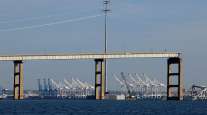Maryland Gov. Hogan Makes Overturn of Road Project Scoring 'Top Priority'

Maryland Gov. Larry Hogan said Dec. 14 he will introduce emergency legislation to overturn a contentious transportation scoring law passed earlier this year, calling its repeal his top priority in the coming General Assembly session.
At a news conference in Annapolis, Hogan warned that upgrades to the Severn River Bridge, widening of Interstate 295 and projects on routes 3, 175 and 198 in Anne Arundel County would be canceled under the law. Backers of the law disagree, saying the measure is advisory and leaves final funding decisions up to the governor.
RELATED: Maryland Democrats have plan to restrict governor on transportation decisions
Hogan specifically criticized House Speaker Mike Busch (D-Annapolis), and bill sponsors Del. Pam Beidle (D-Linthicum) and Sen. Ed DeGrange (D-Millersville), saying they would be “personally and directly responsible for wiping out” projects in their home county.
Busch countered that any cancellation of transportation projects would be Hogan's doing.
“If that takes place, it's strictly on the shoulders of the governor,” he said. “There's nothing in this [law] that would make the governor fund or not fund anything. It just asks the administration to prioritize.”
Passed during the last session, the Maryland Open Transportation Investment Decision Act of 2016 requires the Maryland Department of Transportation to create a scoring system for transportation projects competing for funding. The bill passed by a party line vote.
Democrats lauded the measure as a way to increase transparency in the transportation project selection process. Republicans panned it as an attempt to diminish the Hogan administration's power that would lead to underfunding of projects outside the Washington, D.C. and Baltimore metropolitan areas.
The measure requires the new scoring system to rank projects based on nine listed goals, including safety, environmental stewardship, community vitality and equitable access to transportation.
Hogan, a Republican, vetoed the act, but was promptly overridden.
At the Dec. 14 news conference, Hogan dubbed the legislation the “Road Kill Bill.”
“It will wreak havoc on the entire transportation system and usurp important authority away from local governments and away from the executive branch of state government, giving the authority instead to lobbyists and special interest groups,” he said.
“Today I am here to announce that we will submit emergency legislation for our top priority for this legislative session, which is to push for the full and immediate repeal of this disastrous bill which will absolutely be responsible for the elimination of nearly all of the most important transportation priorities in every single jurisdiction all across the state,” Hogan said in his statement.
“The repercussions of this law are quite simply disastrous for our state, and I can assure you that due to an extremely flawed and biased scoring system implemented by the law, major priority transportation projects will be canceled in every jurisdiction in the state. Under the legislatively mandated scoring system, 66 out of 73 transportation projects are fully canceled.”
In Anne Arundel County, Hogan cited a planned upgrade of Route 3 between Route 50 to Route 32, traffic flow improvements to Route 175 from I-295 to Route 170, an expansion of capacity on Route 198 from I-295 to Route 32, and widening of I-295 from Route 100 to I-195 and the Hanover Road interchange.
Also in danger, he said, is funding for an extra eastbound lane on Route 50, from I-97 to Route 2 that would relieve congestion on the Severn River Bridge.
A ranking of requested transportation projects statewide based on the criteria enumerated in the law lists only projects in Baltimore City and Montgomery, Prince George’s and Howard counties in the top 10. Transportation officials said the state would only be able to fund the top seven projects on the list.
Anne Arundel’s highest-scoring project — upgrades to Route 3 — is ranked at No. 17. A new lane for the Severn River Bridge ranks lowest in the county, at No. 52.
Erin Henson, a spokeswoman for the Maryland Department of Transportation, said less populous counties see their projects score lower because each project’s total combined score must be multiplied by a weighting factor that’s based on the population it will serve.
The governor also listed projects in Baltimore, Frederick, Howard, Prince George's and Montgomery and other counties as on the chopping block.
It is the latest attack on the bill by the Hogan administration.
But legislators who voted for the law said the governor’s concerns are overblown.
They note the bill’s final line specifies that “nothing in this Act may be construed to prohibit or prevent the funding of the capital transportation priorities in each jurisdiction.”
Under the legislation, the state DOT could fund a lower-priority project if it provides “a rational basis for the decision” in writing.
Hogan said the attorney general’s office supported his assertion that the legislation ties his hands and requires him to cancel projects. His office would not immediately provide a letter supporting that claim. A spokeswoman for Attorney General Brian Frosh was not immediately available to comment.
Busch, meanwhile, said local projects getting killed could backfire on the governor, who is popular in Anne Arundel and across the state.
“Anne Arundel County voted for Gov. Hogan; he's had unbelievable support from the county executive,” Busch said. “If he wants to tomorrow, he can go out and build those projects,and is in no way limited by the legislation.”
Baltimore Sun Reporter Erin Cox contributed to this story.




